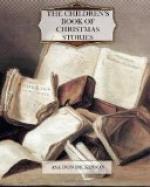“At Christmas there are great feasts in England, too. No one is allowed to go hungry, for the rich people on the day always send meat and cakes to the poor folk round about.
“But we like to make all our days Christmas days, Remember. We try never to forget God’s gifts to us, and they remind us always to be good to other people.”
“And the Christmas carols, Mistress Standish? What are they?”
“On Christmas Eve and early on Christmas morning,” Rose Standish answered, “little children go about from house to house, singing Christmas songs. ’Tis what I like best in all the Christmas cheer. And I promised to sing thee one, did I not?”
Then Mistress Standish sang in her dear, sweet voice the quaint old English words:
As Joseph was a-walking,
He heard an angel sing:
“This night shall be the birth-time
Of Christ, the heavenly King.
“He neither shall be born
In housen nor in hall,
Nor in the place of Paradise,
But in an ox’s stall.
“He neither shall be clothed
In purple nor in pall,
But in the fair white linen
That usen babies all.
“He neither shall be rocked
In silver nor in gold,
But in a wooden manger
That resteth in the mould.”
As Joseph was a-walking
There did an angel sing,
And Mary’s child at midnight
Was born to be our King.
Then be ye glad, good people,
This night of all the year,
And light ye up your candles,
For His star it shineth clear.
Before the song was over, Hannah had come on deck again, and was listening eagerly. “I thank thee, Mistress Standish,” she said, the tears filling her blue eyes. “’Tis long, indeed, since I have heard that song.”
“Would it be wrong for me to learn to sing those words, Mistress Standish?” gently questioned the little girl.
“Nay, Remember, I trow not. The song shall be thy Christmas gift.”
Then Mistress Standish taught the little girl one verse after another of the sweet old carol, and it was not long before Remember could say it all.
The next day was dull and cold, and on Monday, the twenty-fifth, the sky was still overcast. There was no bright Yule log in the Mayflower, and no holly trimmed the little cabin.
The Pilgrims were true to the faith they loved. They held no special service. They made no gifts.
Instead, they went again to the work of cutting the trees, and no one murmured at his hard lot.
“We went on shore,” one man wrote in his diary, “some to fell timber, some to saw, some to rive, and some to carry; so no man rested all that day.”
As for little Remember, she spent the day on board the Mayflower. She heard no one speak of England or sigh for the English home across the sea. But she did not forget Mistress Brewster’s story; and more than once that day, as she was playing by herself, she fancied that she was in front of some English home, helping the English children sing their Christmas songs. And both Mistress Allerton and Mistress Standish, whom God was soon to call away from their earthly home, felt happier and stronger as they heard the little girl singing:




